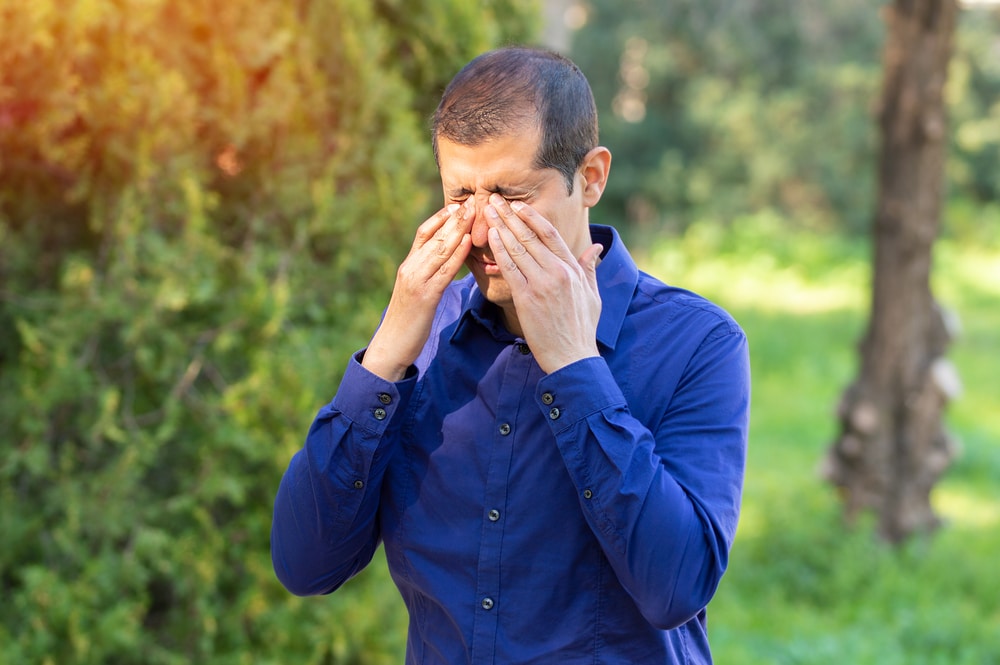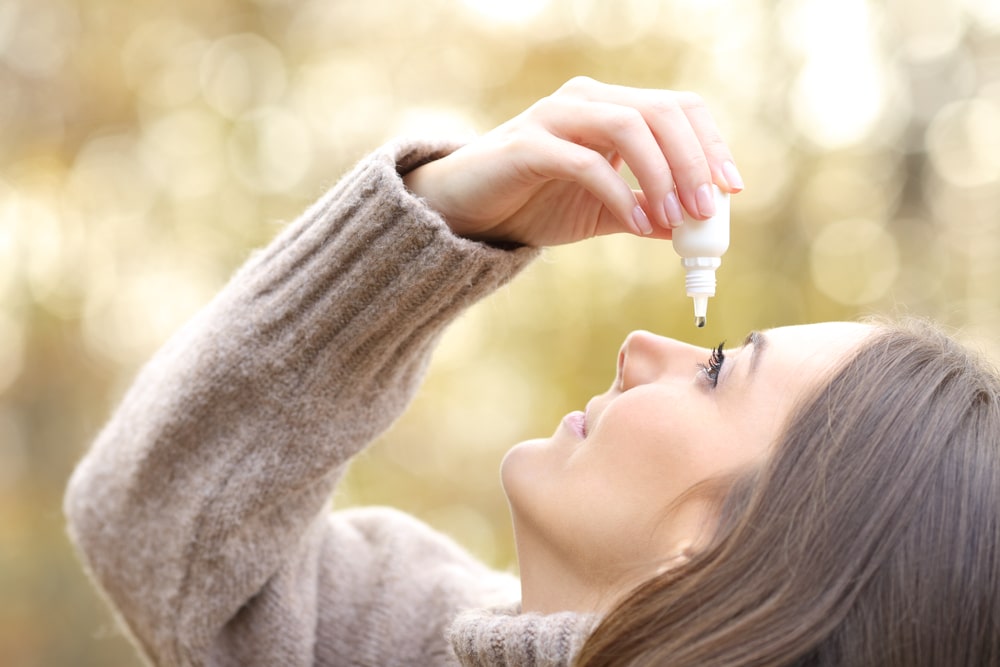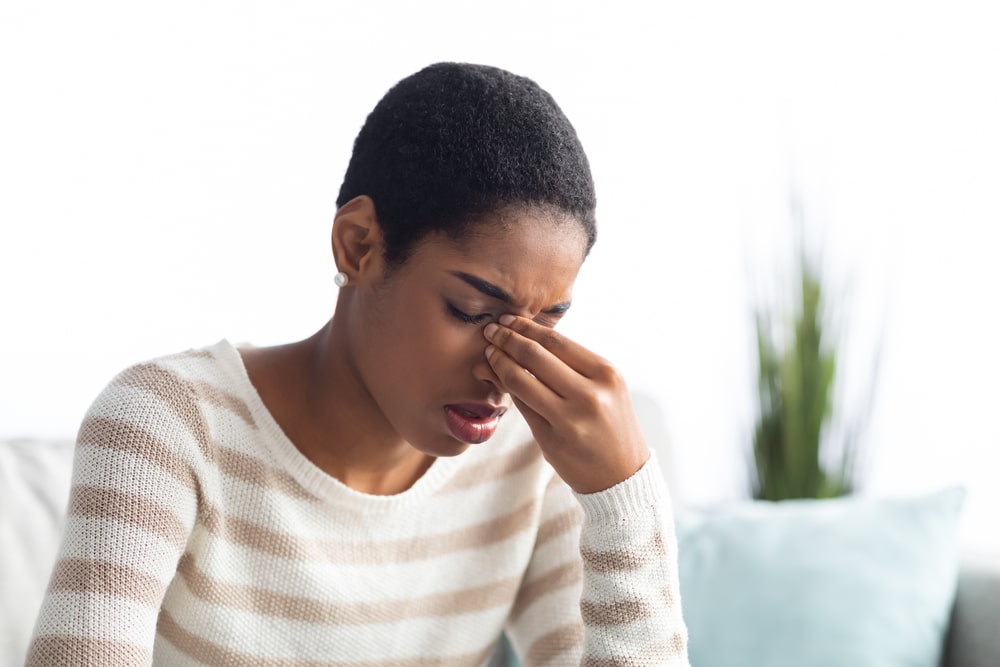If you’ve ever wondered why your eyes feel particularly dry and irritated during certain times of the year, you’re not alone. There may be a connection between seasonal allergies and dry eye symptoms, which helps explain why many patients experience worsening eye discomfort during the spring and fall months.
Other common allergies, such as pet dander and dust, can also contribute to dry eye. Understanding the root cause of your symptoms and receiving a proper diagnosis from an experienced ophthalmologist can help you find the relief you’ve been looking for.
Keep reading to learn more about the connection between allergies and dry eye.
How Allergies Affect Your Eyes

Your eyes rely on a complex tear film consisting of three essential layers: water, oil, and mucus. When functioning properly, this tear film keeps your cornea adequately lubricated and your vision clear.
However, allergic reactions can disrupt this delicate balance in several ways. When allergens like pollen, pet dander, or dust enter your eyes, your immune system responds by releasing histamine and other inflammatory substances.
This response can affect the quality and quantity of your tear production, leading to symptoms of dry eye syndrome. Furthermore, eye allergies, also called allergic conjunctivitis, cause the eyelids and conjunctiva to become red, swollen, and itchy.
The resulting inflammation can interfere with the normal functioning of your tear glands, particularly the meibomian glands that produce the oil layer of your tear film.
What are the Symptoms of Allergy-Related Dry Eye?
The symptoms of allergy-related dry eye can overlap significantly with other conditions, making a proper diagnosis essential for appropriate treatment. Common signs include:
- Persistent itching and burning sensations
- Excessive tearing
- Red, swollen eyelids
- Blurry vision that fluctuates throughout the day
- Sensitivity to light
- A feeling of something in the eye
- Crusting around the eyes, especially upon waking
Many patients also experience accompanying nasal symptoms like sneezing, stuffy nose, and postnasal drip, which can help differentiate allergy-related dry eye from other causes.
Treatment Approaches at Traverse City Eye
The eye doctors at Traverse City Eye offer a comprehensive approach to allergy-related dry eye, combining environmental management with advanced medical treatments. They work closely with patients to develop personalized treatment plans that address both the allergic component and the underlying dry eye symptoms.
Environmental Management and Lifestyle Changes
Effective treatment often begins with reducing exposure to known allergens and adopting simple lifestyle changes. Ophthalmologist recommendations include:

- Using air filtration systems during high pollen seasons
- Keeping windows closed and using air conditioning
- Wearing protective eyewear during outdoor activities
- Maintaining indoor humidity levels between 30 and 50 percent
- Regular cleaning of bedding and living spaces
- Avoiding eye rubbing, especially with allergies related to pet dander
- Using preservative-free artificial tears to wash away allergens before they cause significant irritation
- Incorporating more omega-3 fatty acids into your diet
- Staying hydrated, especially in hot, dry weather
- Limiting screen time to reduce digital eye strain
- Avoiding smoky, windy, or dusty environments
- Applying warm compresses to release blockages in the meibomian glands
Medical Interventions
For patients whose symptoms persist despite lifestyle modifications, Traverse City Eye offers several advanced treatment options:
Prescription Eye Drops
Medications like Restasis and Xiidra target the inflammatory processes that contribute to both allergic reactions and dry eye symptoms. These treatments work by reducing inflammation in the tear glands and improving tear quality over time.
Amniotic Membrane Technology
For severe cases, treatments like Prokera and Biotissue Amniograft use amniotic membrane technology to reduce inflammation and promote healing of damaged eye surfaces.
TearCare
TearCare is an innovative treatment that addresses meibomian gland dysfunction, which often accompanies allergy-related dry eye. The gentle heat therapy helps restore proper oil production in the tear film.
When to Seek Professional Care
While mild allergy-related eye discomfort is common, certain symptoms warrant professional evaluation from the experienced team at Traverse City Eye. Schedule an appointment if you experience:

- Persistent symptoms that don’t improve with over-the-counter treatments
- Vision changes or significant light sensitivity
- Severe eye pain or discharge
- Symptoms that interfere with daily activities
- Recurring irritation that seems to worsen over time
Because allergy-related dry eye can mimic other serious eye conditions, accurate diagnosis is crucial. At Traverse City Eye, the comprehensive evaluation process includes a detailed medical history review, advanced diagnostic testing, and careful examination of your tear film quality and eye surface health.
Are you experiencing dry, irritated, or itchy eyes? You don’t have to live with the discomfort.
The experienced team at Traverse City Eye will work with you to identify the specific causes of your symptoms and develop a personalized treatment plan that addresses both allergic triggers and dry eye symptoms.
With proper diagnosis and treatment, you can enjoy clearer, more comfortable vision and relief from the frustrating symptoms of allergies and dry eye. Schedule your appointment at Traverse City Eye in Traverse City, MI, today!
